|
|
|
Sort Order |
|
|
|
Items / Page
|
|
|
|
|
|
|
| Srl | Item |
| 1 |
ID:
172089
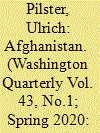

|
|
|
| 2 |
ID:
143279
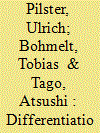

|
|
|
|
|
| Summary/Abstract |
Which factors drive the onset of genocidal violence? While the previous literature identified several important influences, states’ military capabilities for conducting mass-killings and the structure of their security forces have received surprisingly little attention so far. The authors take this shortcoming as a motivation for their research. A theoretical framework is developed, which argues that more differentiated security forces, that is, forces that are composed of a higher number of independent paramilitary and military organizations, are likely to act as a restraint factor in the process leading to state-sponsored mass-killings. Quantitative analyses support the argument for a sample of state-failure years for 1971–2003, and it is also shown that considering a state’s security force structure improves our ability to forecast genocides.
|
|
|
|
|
|
|
|
|
|
|
|
|
|
|
|
| 3 |
ID:
117848
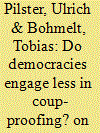

|
|
|
|
|
| Publication |
2012.
|
| Summary/Abstract |
The existing literature on military effectiveness established the robust claim that democracies are more successful and effective in winning interstate wars. One mechanism that explains this relationship heavily draws upon the underlying effect of regime type on civil-military relations. Still, this relationship has not yet been explored systematically, and rigorous empirical research on this issue remains surprisingly scarce. In order to address this shortcoming, this study investigates the patterns of civil-military relations according to different regime types, that is, democracies and nondemocracies. More specifically, the authors examine whether and how democracies invest in coup-proofing, that is, strategies employed to prevent the military from seizing power. The main argument is derived from a principal-agent logic and claims that coup-proofing is both a relatively less attractive and necessary instrument for democratic principals. By analyzing newly compiled time-series cross-sectional data on states' coup-proofing efforts in 1975-1999, the core hypothesis is tested in a quantitative framework.
|
|
|
|
|
|
|
|
|
|
|
|
|
|
|
|
| 4 |
ID:
156243
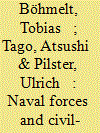

|
|
|
|
|
| Summary/Abstract |
While the importance of navies for international affairs is widely documented, their influence in domestic politics remains less understood. This research offers a comparative account of how states’ naval forces affect civil-military relations. Does the navy matter for military attempts to seize government power? Urban populations, especially middle class elements in the capital city, are more capable (if willing) of creating opportunities for the armed forces to overthrow the government. Recruitment practices and the location of bases often link naval forces more strongly to these societal elements. Thus, countries with a larger navy in relation to the army could be more vulnerable to a coup d’état. The empirical findings, based on the analysis of time-series cross-section data on a sample of all states between 1970 and 2007, provide strong support for this proposition. Several robustness checks further increase our confidence in the results.
|
|
|
|
|
|
|
|
|
|
|
|
|
|
|
|
| 5 |
ID:
145725
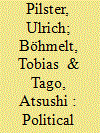

|
|
|
|
|
| Summary/Abstract |
Several studies have claimed that changes in the political leadership of a country affect foreign policy decision making. The following paper systematically tests this in the context of states' participation in military coalition operations. By building on previous theoretical models, the authors argue that new leaders may differ from their predecessors in that the former (i) have dissimilar preferences with regard to the involvement in military interventions, (ii) evaluate relevant information differently, and (iii) are less likely to be entrapped in intervention policies. Ultimately, the net effect of these factors should make it more likely that political leadership turnovers are associated with premature withdrawals from ongoing military coalitions. The theory is tested by quantitative analyses of newly collected data on military coalition operations in 1946–2001 and a qualitative case study. The authors find strong and robust support for their argument.
|
|
|
|
|
|
|
|
|
|
|
|
|
|
|
|
|
|
|
|
|